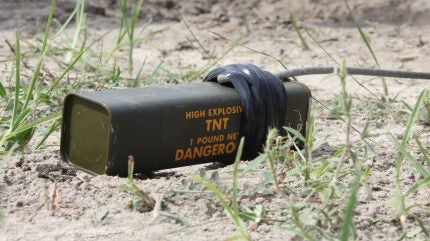
The US will expand in-country explosive manufacturing capabilities following the award by the US Army to Repkon USA-Defense of a $217.5m contract for the design, build, and commission of a Trinitrotoluene facility.
Better known as the acronym TNT, Trinitrotoluene is used in the manufacture of military munitions, and is the prime high explosive used in the production of artillery shells, as well as aerial bombs and infantry grenades. The new facility will be built in Kentucky and expected to be completed by November 2028.
According to the US National Center for Biotechnology Information (NCBI), Trinitrotoluene (TNT) is a yellow, odourless solid that does not occur naturally in the environment, with the overwhelming majority of production being used for defence applications.
The most common type, known as 2,4,6-Trinitrotoluene, is made by combining toluene with a mixture of nitric acid and sulfuric acid, and is also known by other names such as symtrinitrotoluene. Production of 2,4,6-Trinitrotoluene in the US is conducted solely at military arsenal, the NCBI states.
Figures released by the NCBI indicates that the US produced between up to 10m pounds (4.5m kilograms) of 2,4,6-TNT in 2002.
The award will reestablish TNT production “swiftly and at scale” on US soil for the first time in decades, the US Army stated in an 8 November release.
“Reshoring TNT production gives us the ability to control and secure our supply chain for this vital component, especially in an era of increasing global challenges,” said Douglas Bush, Assistant Secretary of the Army for Acquisition, Logistics and Technology.
US expanding ammunition manufacturing capability
The announcement is not the first in recent months related to US military demands for high explosive materials for use in defence applications, with international companies seeking to provide their own expertise amid a rapid expansion of military ammunition production around the world.
In August this year UK-based Astor Defence revealed that it was to expand is operations into the US with the opening of a new manufacturing, production, and testing facility in Florida. The newly created Astor Defense USA would focus on the production of small, medium, and large calibre ammunition cans as well as spiral wound mortar containers.
The company would provide its own military grade TNT products, as well as ball powder propellant for small caliber ammunition, primers, brass cartridge cases, and projectiles, according to a press release.
In September, Army Technology reported that Astor Defence had secured a four-year deal to supply Norwegian-Finnish defence provider Nammo with TNT for the production of 155mm artillery shells, a munition that has seen its demand leap in recent years following Russia’s 2022 invasion of Ukraine.
Supply chains stretched by global demands
In March 2024 a report by GlobalData examined the strain placed on global supply chains as an intensifying rearmament race, driven by geopolitical tensions and escalating defence budget, which highlighted increasing demands for an industrial base struggling to accommodate.
Speaking at the time, James Marques, defence and security analyst at GlobalData, said “vital items” such as artillery shells, air defence missiles, and armoured vehicles were seeing “rates of attrition in the war in Ukraine at rates unheard of in recent times”.
The repercussions of this heightened demand are reverberating across supply chains, with Western nations striving to replenish depleted stocks while simultaneously supporting Ukrainian forces.
The UK, for instance, earlier this year confirmed that it had donated 400,000 artillery shells to Ukraine and had earlier inked deals with companies such as BAE Systems to increase munitions production.
Similarly, companies like Rheinmetall and KNDS in Europe are forging ahead with new production lines to meet the escalating demand.





